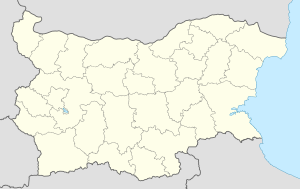Varna
|
Varna Варна (Bulgarian) |
|||
|---|---|---|---|

From top left: Asparuhov most, Black Sea beach, Euxinograd, Varna Archaeological Museum, Stoyan Bachvarov Dramatic Theatre, Dormition of the Mother of God Cathedral, Drazki torpedo boat, Navy Club, Palace of Sports and Culture, Ancient Roman baths, Varna Ethnographic Museum
|
|||
|
|||
| Nickname(s): Marine (or summer) capital of Bulgaria Морска (лятна) столица на България (Bulgarian) Morska (lyatna) stolitsa na Balgariya (transliteration) |
|||
| Location of Varna in Bulgaria | |||
| Coordinates: 43°13′N 27°55′E / 43.217°N 27.917°ECoordinates: 43°13′N 27°55′E / 43.217°N 27.917°E | |||
| Country |
|
||
| Province | Varna | ||
| Municipality | Varna | ||
| Established | 575 BCE | ||
| Government | |||
| • Mayor | Ivan Portnih | ||
| Area | |||
| • Total | 154.236 km2 (59.551 sq mi) | ||
| Elevation | 80 m (260 ft) | ||
| Population (03-15-2016) | |||
| • Total |
|
||
| • Urban |
|
||
| Time zone | EET (UTC+2) | ||
| • Summer (DST) | EEST (UTC+3) | ||
| Postcode | 9000 | ||
| Area code(s) | +359 52 | ||
| Website | www |
||
Varna (Bulgarian: Варна, pronounced [ˈvarnɐ]) is the largest city and seaside resort on the Bulgarian Black Sea Coast, with a population of 334,466 inhabitants as of 2015, while 417,867 live in its functional urban area.
Varna is a major tourist destination, a business and university centre, seaport, and headquarters of the Bulgarian Navy and merchant marine. In 2008, Varna was designated seat of the Black Sea Euro-Region by the Council of Europe.
The oldest gold jewelry in the world, belonging to the Varna culture, was discovered in the Varna Necropolis and dates to 4200-4600 BC.
Theophanes the Confessor first mentioned the name Varna, as the city came to be known with the Slavic conquest of the Balkans in the 6th–7th century. The name could be of Varangian origin, as Varangians had been crossing the Black Sea for many years, reaching Constantinople in the early Middle Ages. In Swedish, the meaning of 'värn' is 'shield', 'defense' - hence Varna is a defended, fortified place. The name may be older than that; perhaps it derives from Proto-Indo-European root we-r- (water) (see also Varuna), or from Proto-Slavic root varn (black), or from Iranian bar or var (camp, fortress: see also Etymological list of provinces of Bulgaria). According to Theophanes, in 680 Asparukh, the founder of the First Bulgarian Empire, routed an army of Constantine IV near the Danube delta and, pursuing it, reached the so-called Varna near Odyssos [sic] (τὴν λεγομένην Βάρναν, πλησίον Ὀδυσσοῦ) and the midlands thereof. Perhaps the new name applied initially to an adjacent river or lake, a Roman military camp, or an inland area, and only later to the city itself. By the late 10th century, the name Varna was established so firmly that when Byzantines wrestled back control of the area from the Bulgarians in the 970's, they kept it rather than restoring the ancient name Odessos. The latter is often said to be of Carian origin, though no modern scholarship supports this.
...
Wikipedia



